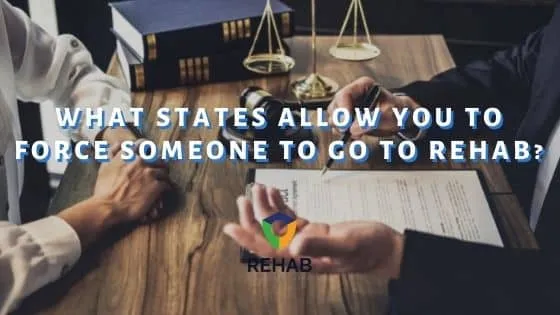Table of Contents
Watching a loved one suffer from addiction is devastating, especially when they are refusing to go to rehab. While some individuals are easily convinced to attend rehab, others have a hard time accepting that they need help.
When your loved one is refusing to go to rehab, you may feel helpless. Constantly worrying about their safety and livelihood may begin to take its toll. You might even begin to wonder if you can just force them to attend rehab.
Thankfully, some states have laws in place that allow the loved ones of addicts to involuntarily commit them to a treatment center. Find out if you live in a state where you can force someone to go to rehab today.
How Does Involuntary Commitment Work?
First things first, if your addicted loved one is a minor, forcing them to go to rehab is a simple process. However, if your loved one is over the age of 18, the process of involuntary commitment can be complicated. This is done to ensure that the people who are being involuntarily committed truly need to be court-ordered into treatment.
Out of all 50 states in the U.S., 37 of them currently have involuntary commitment laws for addiction treatment. Each state has different laws and processes that the loved ones of an addict must follow. However, most involuntary commitment laws follow the same general process.
To force someone to go to rehab, this general criteria must be met:[1]
- The individual’s substance abuse is posing a danger to themselves or others
- Addiction has rendered the individual physically or mentally disabled
- The person is incapacitated or unable to make decisions for themselves
- The individual is unable to fulfill their basic needs and cannot tend to their personal affairs
- Their addiction has caused them to completely lose control
The type of people who are eligible to involuntarily commit an individual into rehab varies from state to state. For example, some states require the individual’s immediate family to involuntarily commit their loved one, while others require a medical professional or law enforcement officer to begin the process.
In every state, the person suffering from addiction must be assessed by a medical professional and found to require substance use disorder treatment.
Which States Allow You to Force Someone to go to Rehab?
37 states in America have laws for involuntary commitment. It is important to note that each state has its own unique process regarding involuntary addiction treatment.
The states that allow you to force someone to go to rehab include:
- Alaska
- Arkansas
- California
- Colorado
- Connecticut
- Delaware
- District of Columbia
- Florida
- Georgia
- Hawaii
- Indiana
- Iowa
- Kansas
- Kentucky
- Louisiana
- Maine
- Massachusetts
- Michigan
- Minnesota
- Mississippi
- Missouri
- Montana
- Nebraska
- North Dakota
- Ohio
- Oklahoma
- Pennsylvania
- Rhode Island
- South Carolina
- South Dakota
- Tennessee
- Texas
- Vermont
- Virginia
- Washington
- West Virginia
- Wisconsin
Different Court-Ordered Rehab Laws
Involuntary commitment to addiction treatment was created to protect struggling addicts. Because addiction causes significant changes in the brain, some individuals may have a hard time making sound decisions for themselves. Allowing for involuntary commitment allows the loved ones of addicts to provide them with the help they need.
However, involuntary commitment cannot be taken lightly. Involuntary rehab laws have strict processes and procedures to ensure that forceful commitment to treatment is in the individual’s best interest.
Some laws that are used in states to force someone to go to rehab include:
Marchman Act
The Hal S. Marchman Act was introduced in 1993 in the state of Florida. This law allows law enforcement officers to take a person under protective custody (with their loved one’s approval) and transport them to an addiction treatment program.[2]
Casey’s Law
Casey’s Law was put into effect in Kentucky in 2004. Matthew Casey Wethington died of a heroin overdose in 2002 and his parents petitioned for an involuntary commitment law to be created. Casey’s Law allows parents, relatives, or friends of addicts to petition the court for involuntary treatment on their loved one’s behalf.[3]
Ricky’s Law
In 2018, Ricky’s Law went into effect in Washington. This law allows for adults or youth who present a danger to themselves or others, or are disabled from drug and alcohol abuse, to be involuntarily committed to treatment.[4]
Substance Use Emergency Commitment
The Substance Use Emergency Commitment or Substance Use Involuntary Commitment Law is Colorado’s forceful rehab law. This law requires a judge to grant a civil commitment order to involuntarily commit an individual suffering from addiction.
It is considered the last option and helps people who refuse voluntary treatment, pose an imminent danger to themselves or others, are medically and psychiatrically stable, and would benefit from treatment.[5]
Massachusetts General Law Chapter 123, Section 35
This Massachusetts law allows a spouse, guardian, blood relative, police officer, physician, or court official to file a petition asking the court to involuntarily commit an individual to substance abuse rehab.
Finding Addiction Treatment for a Loved One
If your loved one suffers from addiction, finding a reputable treatment center for them to attend is of the utmost importance. Because there are so many options, choosing the right treatment center can be difficult. At Rehab Recovery Centers, our job is to make that process easier for you and your family.
For help with finding an addiction treatment center suited to your loved one’s individual needs, contact Rehab Recovery Centers today.
References:
- https://cdhs.colorado.gov/behavioral-health/substance-use-commitment
- https://marchmanactflorida.com/faq/
- https://odcp.ky.gov/Resources/Pages/Caseys-Law.aspx
- https://www.hca.wa.gov/about-hca/behavioral-health-recovery/ricky-s-law-involuntary-treatment-act
- https://cdhs.colorado.gov/behavioral-health/substance-use-commitment
- https://www.mass.gov/service-details/section-35-the-process
Get Help Today
Don’t go through the process of recovery alone. There are people who can help you with the struggle you’re facing. Get in touch with one today.


